Framework of Learning Program: MTN Call Centre Supervisors Training
VerifiedAdded on 2021/04/16
|7
|1346
|35
Report
AI Summary
This report details a comprehensive learning framework designed for newly employed supervisors at MTN call centres in South Africa. The program aims to equip supervisors with essential skills to enhance their performance and contribute to the company's profitability. The framework is structured around learning objectives, content, and justification of learning methods. Learning objectives include evaluation, synthesis, analysis, application, comprehension, knowledge, people management, selection skills, delegation and task assignment, and company understanding. The program incorporates theoretical lessons using PowerPoint presentations and practical elements such as video analysis of call centre activities and podcasts focusing on customer handling. On-the-job training in MTN call centres allows for practical application of learned skills. The report emphasizes the importance of aligning training with real-world job requirements to ensure supervisors can effectively apply their knowledge and contribute to MTN's success. The framework is justified by its potential to improve employee performance and bridge the gap between theoretical knowledge and practical application.
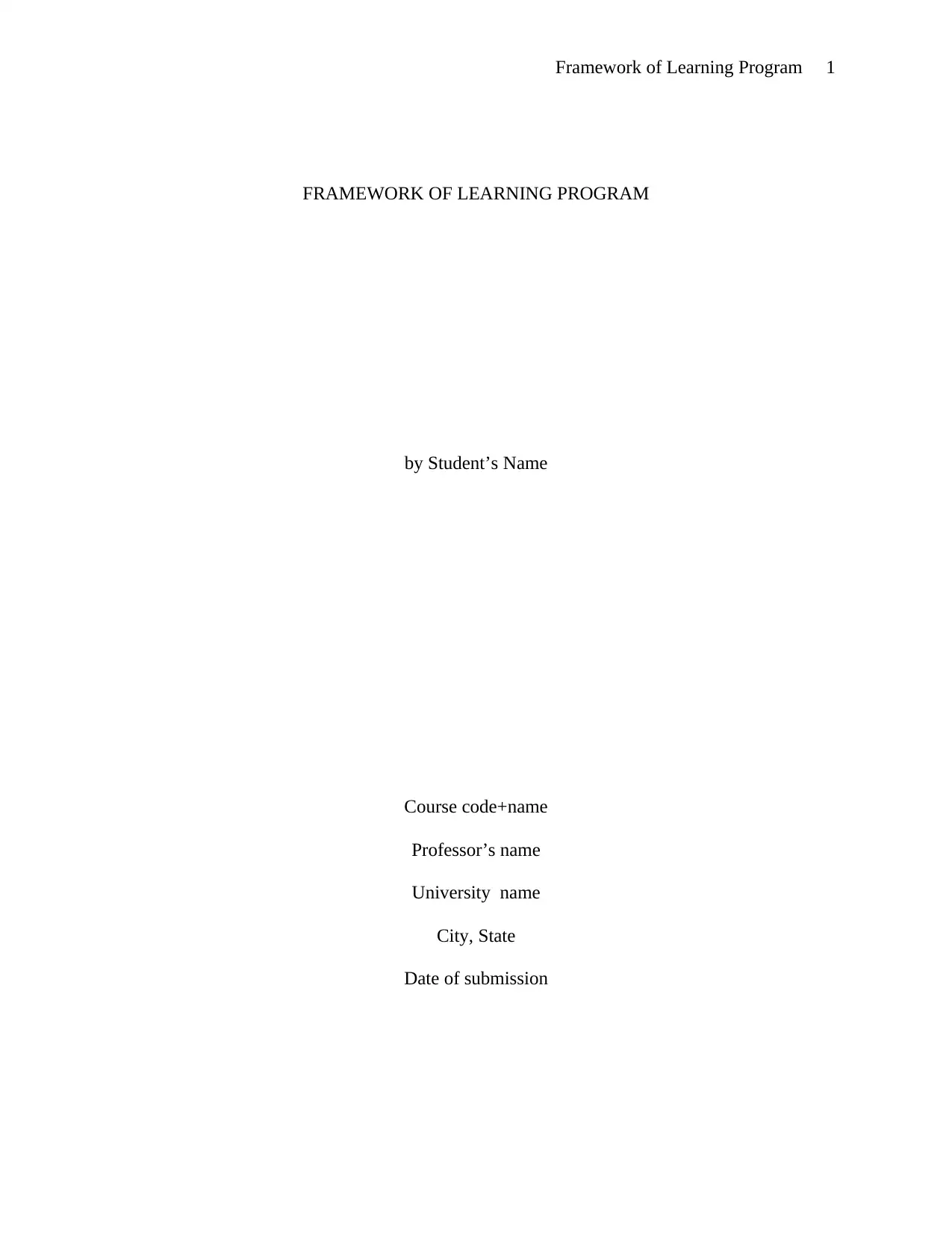
Framework of Learning Program 1
FRAMEWORK OF LEARNING PROGRAM
by Student’s Name
Course code+name
Professor’s name
University name
City, State
Date of submission
FRAMEWORK OF LEARNING PROGRAM
by Student’s Name
Course code+name
Professor’s name
University name
City, State
Date of submission
Paraphrase This Document
Need a fresh take? Get an instant paraphrase of this document with our AI Paraphraser
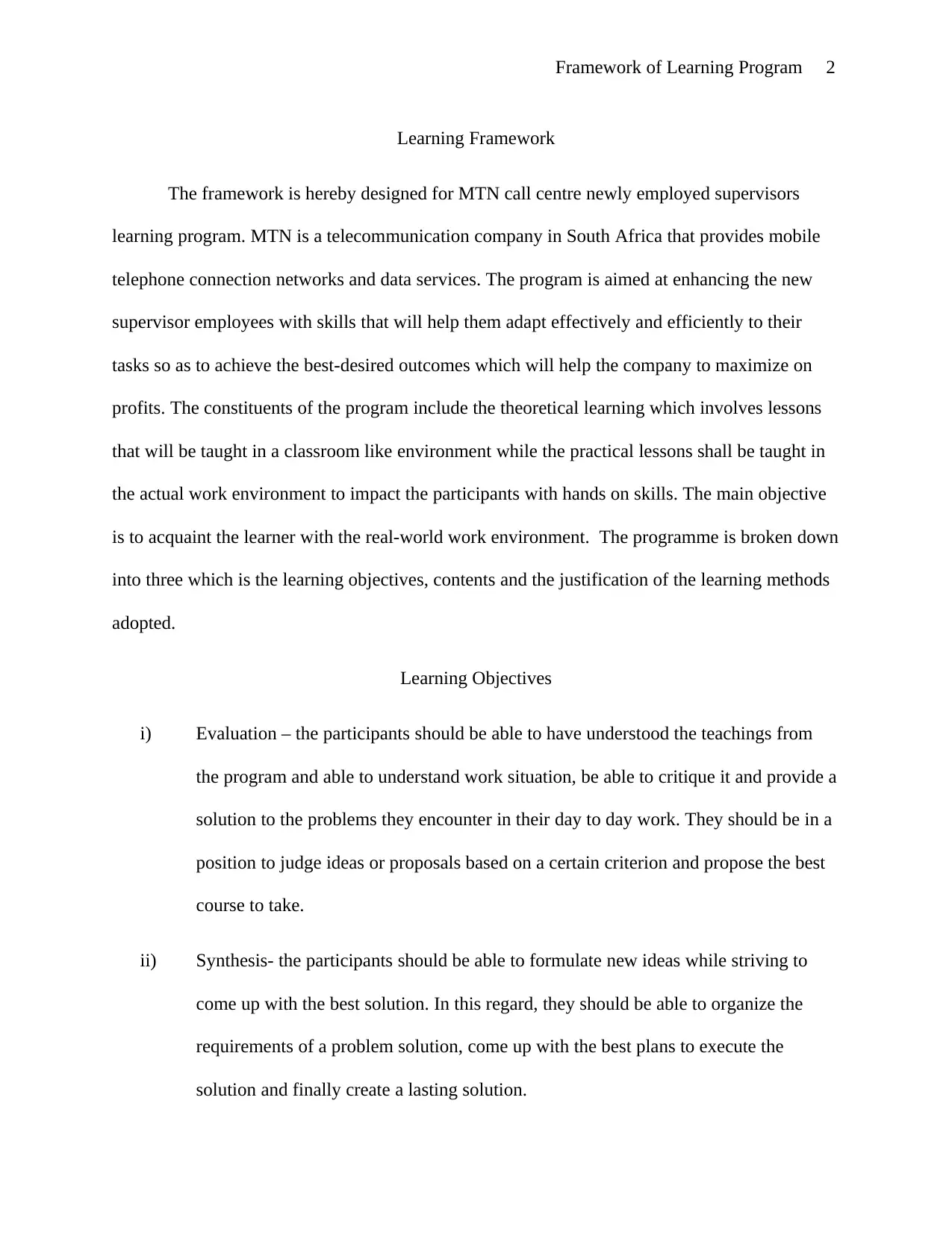
Framework of Learning Program 2
Learning Framework
The framework is hereby designed for MTN call centre newly employed supervisors
learning program. MTN is a telecommunication company in South Africa that provides mobile
telephone connection networks and data services. The program is aimed at enhancing the new
supervisor employees with skills that will help them adapt effectively and efficiently to their
tasks so as to achieve the best-desired outcomes which will help the company to maximize on
profits. The constituents of the program include the theoretical learning which involves lessons
that will be taught in a classroom like environment while the practical lessons shall be taught in
the actual work environment to impact the participants with hands on skills. The main objective
is to acquaint the learner with the real-world work environment. The programme is broken down
into three which is the learning objectives, contents and the justification of the learning methods
adopted.
Learning Objectives
i) Evaluation – the participants should be able to have understood the teachings from
the program and able to understand work situation, be able to critique it and provide a
solution to the problems they encounter in their day to day work. They should be in a
position to judge ideas or proposals based on a certain criterion and propose the best
course to take.
ii) Synthesis- the participants should be able to formulate new ideas while striving to
come up with the best solution. In this regard, they should be able to organize the
requirements of a problem solution, come up with the best plans to execute the
solution and finally create a lasting solution.
Learning Framework
The framework is hereby designed for MTN call centre newly employed supervisors
learning program. MTN is a telecommunication company in South Africa that provides mobile
telephone connection networks and data services. The program is aimed at enhancing the new
supervisor employees with skills that will help them adapt effectively and efficiently to their
tasks so as to achieve the best-desired outcomes which will help the company to maximize on
profits. The constituents of the program include the theoretical learning which involves lessons
that will be taught in a classroom like environment while the practical lessons shall be taught in
the actual work environment to impact the participants with hands on skills. The main objective
is to acquaint the learner with the real-world work environment. The programme is broken down
into three which is the learning objectives, contents and the justification of the learning methods
adopted.
Learning Objectives
i) Evaluation – the participants should be able to have understood the teachings from
the program and able to understand work situation, be able to critique it and provide a
solution to the problems they encounter in their day to day work. They should be in a
position to judge ideas or proposals based on a certain criterion and propose the best
course to take.
ii) Synthesis- the participants should be able to formulate new ideas while striving to
come up with the best solution. In this regard, they should be able to organize the
requirements of a problem solution, come up with the best plans to execute the
solution and finally create a lasting solution.
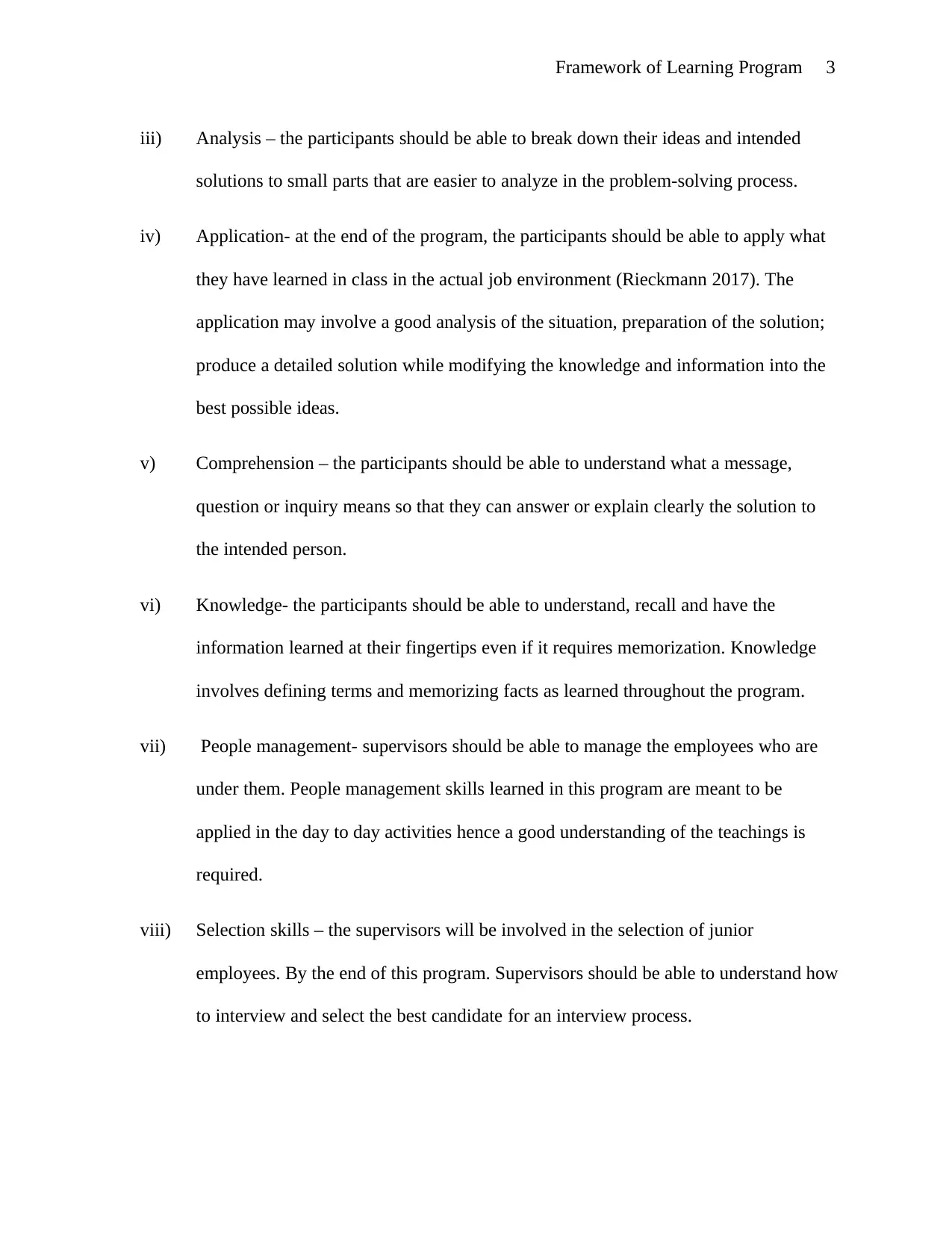
Framework of Learning Program 3
iii) Analysis – the participants should be able to break down their ideas and intended
solutions to small parts that are easier to analyze in the problem-solving process.
iv) Application- at the end of the program, the participants should be able to apply what
they have learned in class in the actual job environment (Rieckmann 2017). The
application may involve a good analysis of the situation, preparation of the solution;
produce a detailed solution while modifying the knowledge and information into the
best possible ideas.
v) Comprehension – the participants should be able to understand what a message,
question or inquiry means so that they can answer or explain clearly the solution to
the intended person.
vi) Knowledge- the participants should be able to understand, recall and have the
information learned at their fingertips even if it requires memorization. Knowledge
involves defining terms and memorizing facts as learned throughout the program.
vii) People management- supervisors should be able to manage the employees who are
under them. People management skills learned in this program are meant to be
applied in the day to day activities hence a good understanding of the teachings is
required.
viii) Selection skills – the supervisors will be involved in the selection of junior
employees. By the end of this program. Supervisors should be able to understand how
to interview and select the best candidate for an interview process.
iii) Analysis – the participants should be able to break down their ideas and intended
solutions to small parts that are easier to analyze in the problem-solving process.
iv) Application- at the end of the program, the participants should be able to apply what
they have learned in class in the actual job environment (Rieckmann 2017). The
application may involve a good analysis of the situation, preparation of the solution;
produce a detailed solution while modifying the knowledge and information into the
best possible ideas.
v) Comprehension – the participants should be able to understand what a message,
question or inquiry means so that they can answer or explain clearly the solution to
the intended person.
vi) Knowledge- the participants should be able to understand, recall and have the
information learned at their fingertips even if it requires memorization. Knowledge
involves defining terms and memorizing facts as learned throughout the program.
vii) People management- supervisors should be able to manage the employees who are
under them. People management skills learned in this program are meant to be
applied in the day to day activities hence a good understanding of the teachings is
required.
viii) Selection skills – the supervisors will be involved in the selection of junior
employees. By the end of this program. Supervisors should be able to understand how
to interview and select the best candidate for an interview process.
⊘ This is a preview!⊘
Do you want full access?
Subscribe today to unlock all pages.

Trusted by 1+ million students worldwide
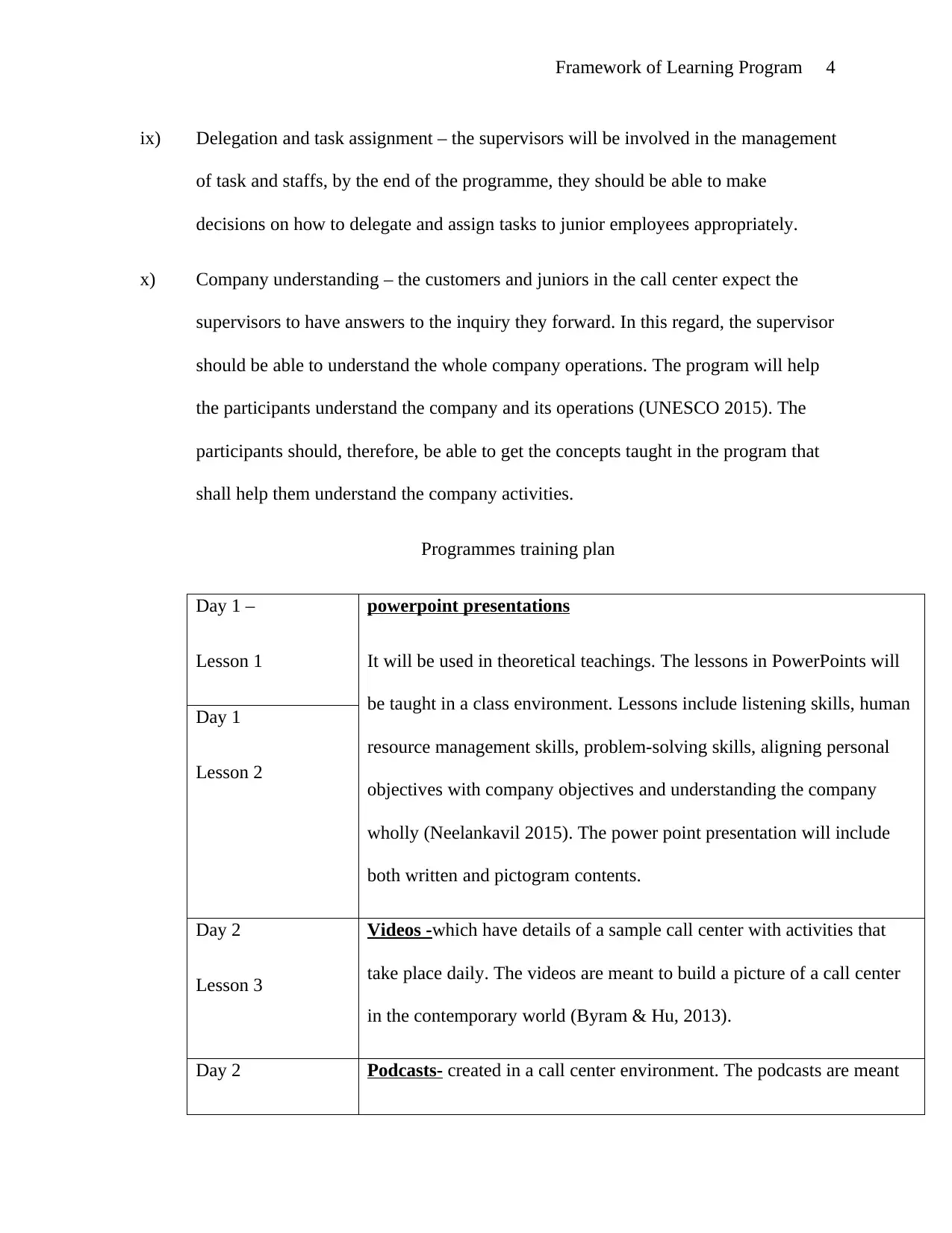
Framework of Learning Program 4
ix) Delegation and task assignment – the supervisors will be involved in the management
of task and staffs, by the end of the programme, they should be able to make
decisions on how to delegate and assign tasks to junior employees appropriately.
x) Company understanding – the customers and juniors in the call center expect the
supervisors to have answers to the inquiry they forward. In this regard, the supervisor
should be able to understand the whole company operations. The program will help
the participants understand the company and its operations (UNESCO 2015). The
participants should, therefore, be able to get the concepts taught in the program that
shall help them understand the company activities.
Programmes training plan
Day 1 –
Lesson 1
powerpoint presentations
It will be used in theoretical teachings. The lessons in PowerPoints will
be taught in a class environment. Lessons include listening skills, human
resource management skills, problem-solving skills, aligning personal
objectives with company objectives and understanding the company
wholly (Neelankavil 2015). The power point presentation will include
both written and pictogram contents.
Day 1
Lesson 2
Day 2
Lesson 3
Videos -which have details of a sample call center with activities that
take place daily. The videos are meant to build a picture of a call center
in the contemporary world (Byram & Hu, 2013).
Day 2 Podcasts- created in a call center environment. The podcasts are meant
ix) Delegation and task assignment – the supervisors will be involved in the management
of task and staffs, by the end of the programme, they should be able to make
decisions on how to delegate and assign tasks to junior employees appropriately.
x) Company understanding – the customers and juniors in the call center expect the
supervisors to have answers to the inquiry they forward. In this regard, the supervisor
should be able to understand the whole company operations. The program will help
the participants understand the company and its operations (UNESCO 2015). The
participants should, therefore, be able to get the concepts taught in the program that
shall help them understand the company activities.
Programmes training plan
Day 1 –
Lesson 1
powerpoint presentations
It will be used in theoretical teachings. The lessons in PowerPoints will
be taught in a class environment. Lessons include listening skills, human
resource management skills, problem-solving skills, aligning personal
objectives with company objectives and understanding the company
wholly (Neelankavil 2015). The power point presentation will include
both written and pictogram contents.
Day 1
Lesson 2
Day 2
Lesson 3
Videos -which have details of a sample call center with activities that
take place daily. The videos are meant to build a picture of a call center
in the contemporary world (Byram & Hu, 2013).
Day 2 Podcasts- created in a call center environment. The podcasts are meant
Paraphrase This Document
Need a fresh take? Get an instant paraphrase of this document with our AI Paraphraser
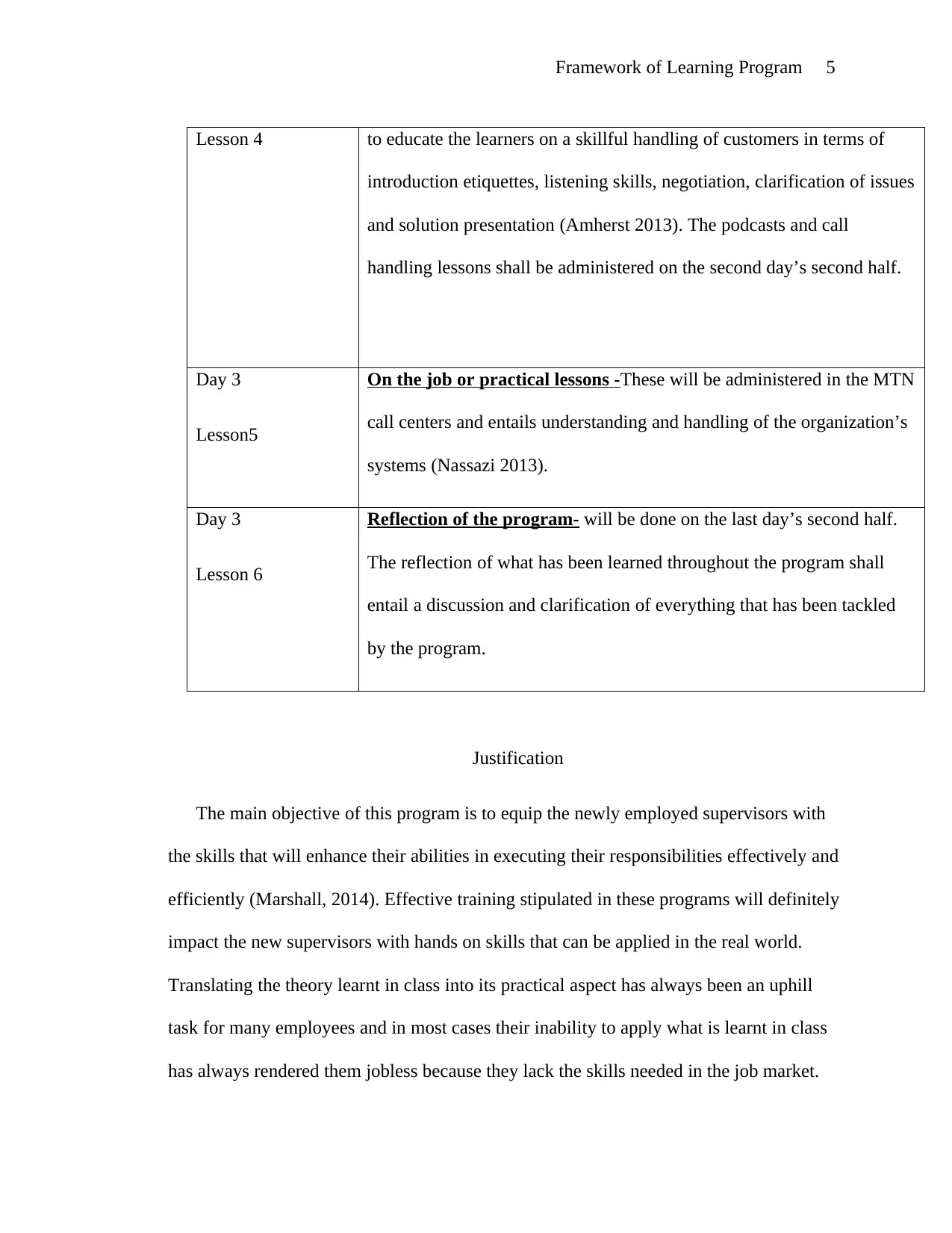
Framework of Learning Program 5
Lesson 4 to educate the learners on a skillful handling of customers in terms of
introduction etiquettes, listening skills, negotiation, clarification of issues
and solution presentation (Amherst 2013). The podcasts and call
handling lessons shall be administered on the second day’s second half.
Day 3
Lesson5
On the job or practical lessons -These will be administered in the MTN
call centers and entails understanding and handling of the organization’s
systems (Nassazi 2013).
Day 3
Lesson 6
Reflection of the program- will be done on the last day’s second half.
The reflection of what has been learned throughout the program shall
entail a discussion and clarification of everything that has been tackled
by the program.
Justification
The main objective of this program is to equip the newly employed supervisors with
the skills that will enhance their abilities in executing their responsibilities effectively and
efficiently (Marshall, 2014). Effective training stipulated in these programs will definitely
impact the new supervisors with hands on skills that can be applied in the real world.
Translating the theory learnt in class into its practical aspect has always been an uphill
task for many employees and in most cases their inability to apply what is learnt in class
has always rendered them jobless because they lack the skills needed in the job market.
Lesson 4 to educate the learners on a skillful handling of customers in terms of
introduction etiquettes, listening skills, negotiation, clarification of issues
and solution presentation (Amherst 2013). The podcasts and call
handling lessons shall be administered on the second day’s second half.
Day 3
Lesson5
On the job or practical lessons -These will be administered in the MTN
call centers and entails understanding and handling of the organization’s
systems (Nassazi 2013).
Day 3
Lesson 6
Reflection of the program- will be done on the last day’s second half.
The reflection of what has been learned throughout the program shall
entail a discussion and clarification of everything that has been tackled
by the program.
Justification
The main objective of this program is to equip the newly employed supervisors with
the skills that will enhance their abilities in executing their responsibilities effectively and
efficiently (Marshall, 2014). Effective training stipulated in these programs will definitely
impact the new supervisors with hands on skills that can be applied in the real world.
Translating the theory learnt in class into its practical aspect has always been an uphill
task for many employees and in most cases their inability to apply what is learnt in class
has always rendered them jobless because they lack the skills needed in the job market.
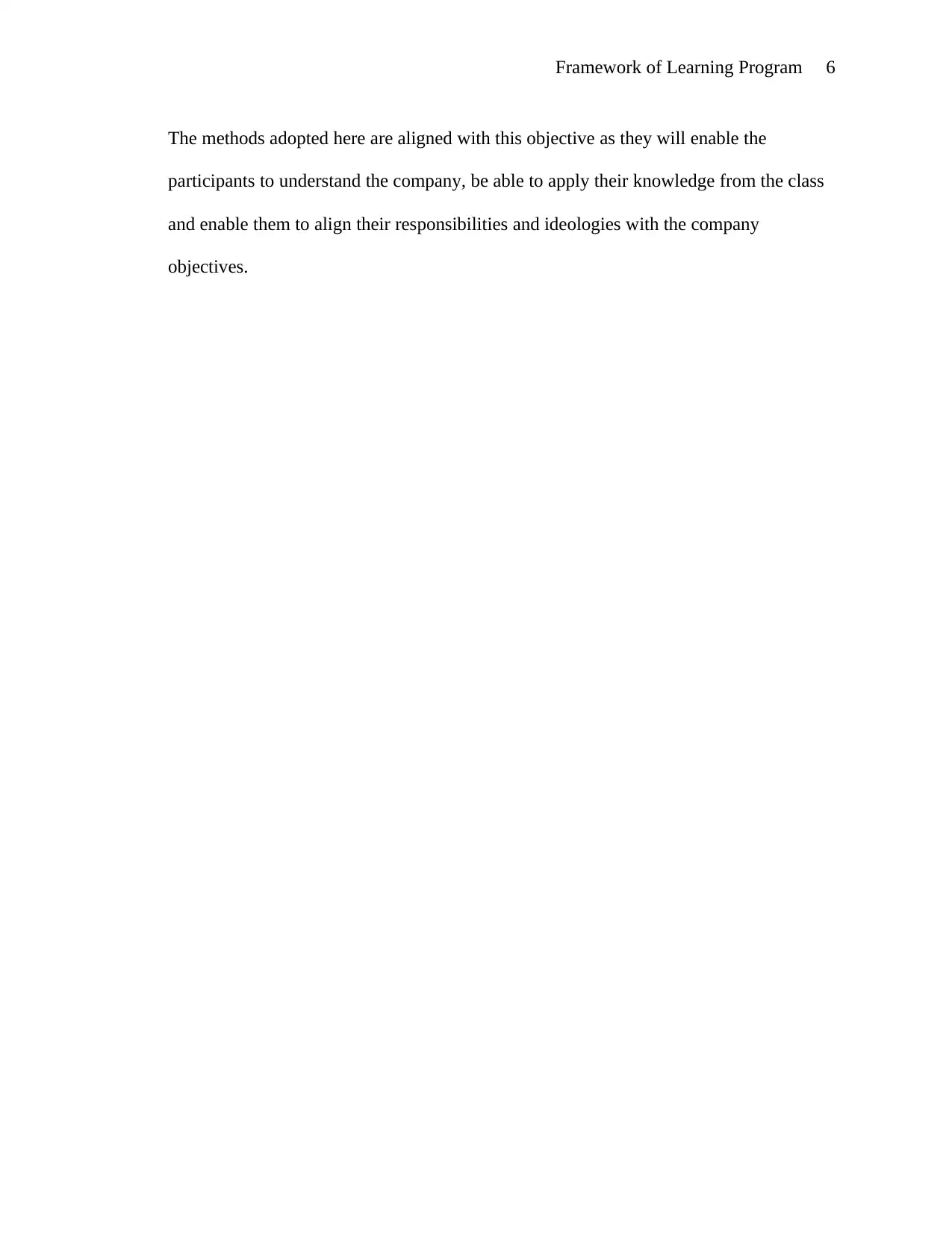
Framework of Learning Program 6
The methods adopted here are aligned with this objective as they will enable the
participants to understand the company, be able to apply their knowledge from the class
and enable them to align their responsibilities and ideologies with the company
objectives.
The methods adopted here are aligned with this objective as they will enable the
participants to understand the company, be able to apply their knowledge from the class
and enable them to align their responsibilities and ideologies with the company
objectives.
⊘ This is a preview!⊘
Do you want full access?
Subscribe today to unlock all pages.

Trusted by 1+ million students worldwide
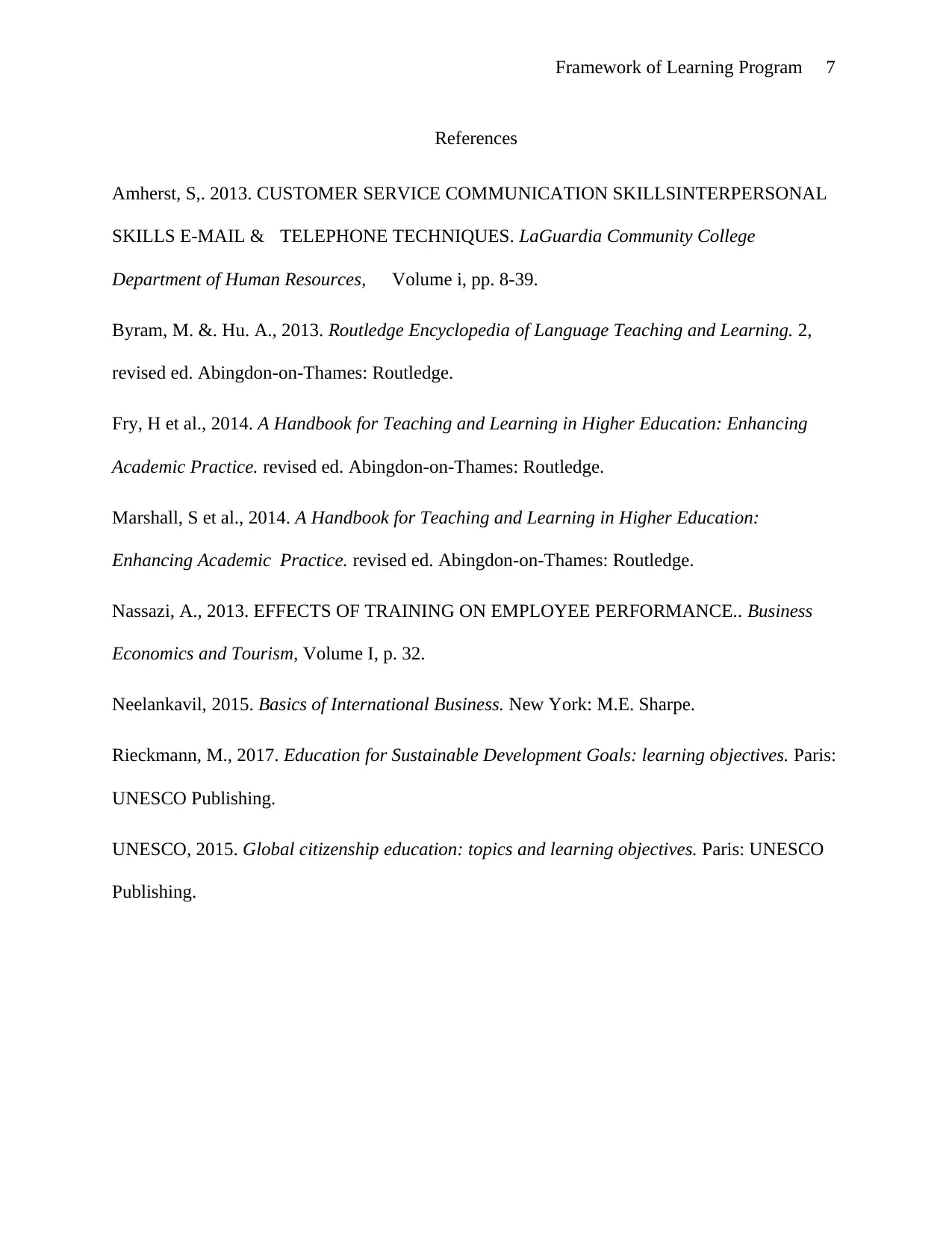
Framework of Learning Program 7
References
Amherst, S,. 2013. CUSTOMER SERVICE COMMUNICATION SKILLSINTERPERSONAL
SKILLS E-MAIL & TELEPHONE TECHNIQUES. LaGuardia Community College
Department of Human Resources, Volume i, pp. 8-39.
Byram, M. &. Hu. A., 2013. Routledge Encyclopedia of Language Teaching and Learning. 2,
revised ed. Abingdon-on-Thames: Routledge.
Fry, H et al., 2014. A Handbook for Teaching and Learning in Higher Education: Enhancing
Academic Practice. revised ed. Abingdon-on-Thames: Routledge.
Marshall, S et al., 2014. A Handbook for Teaching and Learning in Higher Education:
Enhancing Academic Practice. revised ed. Abingdon-on-Thames: Routledge.
Nassazi, A., 2013. EFFECTS OF TRAINING ON EMPLOYEE PERFORMANCE.. Business
Economics and Tourism, Volume I, p. 32.
Neelankavil, 2015. Basics of International Business. New York: M.E. Sharpe.
Rieckmann, M., 2017. Education for Sustainable Development Goals: learning objectives. Paris:
UNESCO Publishing.
UNESCO, 2015. Global citizenship education: topics and learning objectives. Paris: UNESCO
Publishing.
References
Amherst, S,. 2013. CUSTOMER SERVICE COMMUNICATION SKILLSINTERPERSONAL
SKILLS E-MAIL & TELEPHONE TECHNIQUES. LaGuardia Community College
Department of Human Resources, Volume i, pp. 8-39.
Byram, M. &. Hu. A., 2013. Routledge Encyclopedia of Language Teaching and Learning. 2,
revised ed. Abingdon-on-Thames: Routledge.
Fry, H et al., 2014. A Handbook for Teaching and Learning in Higher Education: Enhancing
Academic Practice. revised ed. Abingdon-on-Thames: Routledge.
Marshall, S et al., 2014. A Handbook for Teaching and Learning in Higher Education:
Enhancing Academic Practice. revised ed. Abingdon-on-Thames: Routledge.
Nassazi, A., 2013. EFFECTS OF TRAINING ON EMPLOYEE PERFORMANCE.. Business
Economics and Tourism, Volume I, p. 32.
Neelankavil, 2015. Basics of International Business. New York: M.E. Sharpe.
Rieckmann, M., 2017. Education for Sustainable Development Goals: learning objectives. Paris:
UNESCO Publishing.
UNESCO, 2015. Global citizenship education: topics and learning objectives. Paris: UNESCO
Publishing.
1 out of 7
Related Documents
Your All-in-One AI-Powered Toolkit for Academic Success.
+13062052269
info@desklib.com
Available 24*7 on WhatsApp / Email
![[object Object]](/_next/static/media/star-bottom.7253800d.svg)
Unlock your academic potential
Copyright © 2020–2025 A2Z Services. All Rights Reserved. Developed and managed by ZUCOL.





